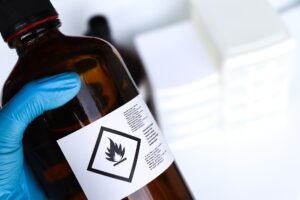4 Urgent Things You Need to Know About Solvents
July 30, 2014
Solvents are substances that are used to dissolve or extract solutes, or for cleaning purposes. They are common in household products (such as cleaning products, spot removers, paint, nail polish remover, pharmaceutical products, and adhesives), and have numerous applications in construction, manufacturing, pharmaceutical, chemical, and oil and gas industries.
The industrial solvent marketing is booming, and demand is expected to continue growing in the coming years. Millions of workers are already exposed on a daily basis, and that number will also continue to grow. Because these substances are so commonplace, they definitely warrant some attention.
We’ve made it easy on you, collecting the 4 most important things about solvents that you need to know.

Flammable liquid symbol on the chemical bottle, hazardous chemicals in the industry
1.) There are significant associated health risks. Solvent exposure can occur by ingestion, inhalation, or through skin contact. Regular solvent exposure can result in depression, fatigue, stomach pains, dizziness, headaches, and nausea. Prolonged solvent exposure can include liver and kidney impairment, cancer, respiratory issues, dermatitis, blindness, and toxicity to the nervous system. Massive solvent exposure can lead to sudden death. If you believe you have been exposed to solvents, you need to bring this to your doctor’s attention – and if you believe you’ve been wrongly exposed to solvents in your workplace, get in touch with OSHA. Workers have the right to a safe work environment.
2.) Solvents are also dangerous to your health (and property) in a different way – they’re extremely flammable. The interaction between solvent vapors and air can lead to explosions. Solvent vapors also carry more weight than air, and have been found in containers which were thought to have been empty. To eliminate the risk of a flash-fire, empty drums of solvents need to be stored open and upside down.
3.) Solvents are regulated as listed wastes. A listed waste is a solid waste that appears on any of the EPA hazardous waste lists found in 40 CFR 261 Subpart D (F, K, U, and P listed wastes). According to the mixture rule, even solvent-contaminated wipes and rags must be handled as listed wastes.
4.) Due to alarming toxicity to humans and broadening regulatory and environmental pressures, many companies are seeing a demand for “greener” solvents. It’s a precarious position to be in for businesses that require solvents, as these “greener” options are more environmentally friendly – but they are also more costly, and some argue that they contribute to lower quality.
Providing you with expert information is just one of the ways we channel our care and concern for our customers and visitors. For more information on solvents or other hazardous waste disposal concerns, please contact Hazardous Waste Experts today at 800-936-2311.

